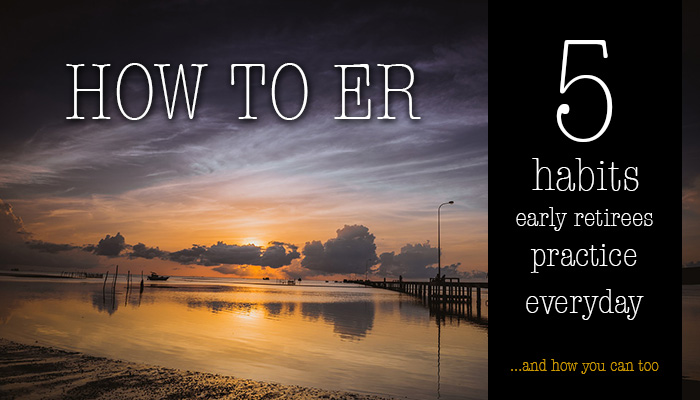How to ER: 5 easy habits early retirees practice everyday

The habits of early retirees tend to be profoundly powerful, yet strangely simple. We all know that early retirees "save money" - that goes without saying. But what else? And how many of these lifestyle techniques could be picked up and mastered by anyone? Probably more than you think.
These habits work, and work well. We practice them all the time. Most early retirees and future early retirees practice these and, dare I say, have mastered them. And chances are, if you share our dream of retiring early, you probably follow many of them, too.
The 5 habits of early retirees

They prioritize retirement over spending money - Clearly, early retirees save money. How much? We save around 70% of our income every month. Some save more while many others tend to set their sights on saving at least 50% of their income. Whatever the percentage, early retirees just SAVE A TON. Not only does this habit help acquire the wealth needed to see early retirees through their much longer retirement timespans, but it also helps to establish healthy lifestyle decisions, like living sensibly, understanding "enough" and recognizing what truly makes us happy in life.
Remember, even if you aren't pulling in 100 Gs a year, early retirement can still be for you.
How we are following this habit: We save as much as possible. Literally, it is as easy as that - I realized that the more we save, the earlier we can retire. My wife and I now prioritize retirement over spending money by saying "no" to invitations to dinners and sporting events, or anything that costs money that won't bring genuine happiness into our lives. No more $100 date nights, or spending cash on cable or satellite television, or an expensive phone. These changes have made a world of difference and believe it or not, neither of us feel like we are "sacrificing" happiness, because those things never TRULY made us happy to begin with.
They understand where their money is going - One of the best ways to save is by knowing where your money is being spent every month. I haven't met very many early retirees who don't have a precise understanding of how much they spend - AND ON WHAT. This process need not take hours and hours to keep up with, either - once your initial system of tracking your expenses is setup, maintaining it should be as easy as plugging numbers in - and sometimes, not even that! Applications like Personal Capital and Mint can help you get started. And, this is how we approach tracking our expenses.
How we are following this habit: We meticulously budget and know where every dollar that we spend every month is going. My wife takes the reigns on this and knows how much we spend on, say, potatoes from month to month, or gas for our cars as well as discretionary spending that we choose to drop money on (I enjoy Vodka tonics in the evening, for example, and we account for these kinds of expenses within our budget). We have a category in our budget to account for every dollar that leaves our bank account, and whenever we feel like we're spending too much money, this is the first place that we look. Also we are able to save money on gas by using Upside
They get out of their comfort zones - I wrote about this recently - the ability to escape our comfort zones helps our ability to retire early. Like I wrote about before, getting out of your comfort zone is a mind-game. Spending is an addiction, and people’s minds keep planting the seeds of comfort within the decision-making process.
Getting out of your comfort zone means engaging in uncomfortable conversations and NOT choosing the status quo when making decisions. It's about looking people square in the eye as you walk past them rather than avoiding eye contact. For an introvert, it's about willingly introducing themselves with ease at a dinner party.
It may also be telling your boss that you're retiring even though he or she is 20 years older than you.
How we are following this habit: I keep myself out of my comfort zone by trying new things - even small things, like food, can help train your mind to entertain the option of avoiding the trap of comfort. Changes in my diet happen to be a substantial reason why I feel so happy and healthy. I switched to a primarily vegetarian and vegan diet when cooking at home with my wife, a change that I would never have considered before. I was a meat-eating machine. That was my comfort. Since I married my wife and started embracing a new way to eat, my energy has increased, I've lost quite a bit of weight and I just can't wait to go to the gym every day.
How does making a change to your diet apply to early retirement? Spending works the same way. I used to spend like it was going out of style. Cars, motorcycles, restaurants, HD satellite service...yeah, the basic shit that Americans spend their money on.
Finally, I stepped outside of my comfort zone and said no more.
I began making uncomfortable decisions, like:
- I stopped buying crap and saved my earnings instead.
- I sold my precious Corvette that I thought I loved so much.
- I also sold my Yamaha R1 sports bike that drained me of hundreds a month in insurance.
- I downsized my belongs to only those things I've used in the past year.
- I began saying "no" to restaurant invitations and expensive travel.
In other words, early retirees make decisions that are in line and supportive of their financial goals and do not let society or friends/family affect their financial situation - even if those decisions are uncomfortable.
They tend to be extremely optimistic - Certainly, if you're looking to retire early and enjoy a life outside of the office, you gotta be pretty damn optimistic about the future. The thought that your stash will last you 30, 40 or even 50 years or more without having to work means you're generally positive about the future and believe that things will work out.
This level of optimism applies to everything in life, not just early retirement. Early retirees take a glass half full approach to most things, from making life-altering decisions about work to picking the right wine to sip on during dinner - and everything in-between. They expect things to go well, and as we know from the powerful placebo effect, this phenomenon is very real.
After all, how many early retirees do you know that are mad all the time?
Note: Of course, we are not talking about "blind" optimism. Early retirees are always wise to plan ahead and account for when things do not go as planned. One must be a realist and understand the realities of the world while letting optimism take us to some truly amazing places in life. It definitely has for my wife and me.
How we are following this habit: Except when it comes to my fantasy football team, I'm a damn positive person. So is my wife (luckily, her fantasy team is superior to mine!). We believe in the general goodness of the world and don't let the evening news cloud our outlook on life. Over the years, we have realized that attitude is an important key to keeping your head on straight, and our positive attitudes help to bring us through each and every day as we work towards financial independence and early retirement.
They spend money on experiences, not things - Things lose value, but early retirees understand that experiences tend to appreciate within our heads. Today, I would much rather take an inexpensive vacation to somewhere I love (like Sedona, AZ for example) than get stuff wrapped up as gifts. Early retirees are over "stuff" and have often found that the less stuff they have, the more simple life becomes. Why? Maintenance and Storage, baby! Who wants to spend 50 years of blissful retirement with a bunch of crap in the closet to deal with every time the door is slid open? Not this guy.
How we are following this habit: Both my wife and I don't want stuff anymore, so we get each other the gift of experiences. Last Christmas, we took a trip out to Key West, FL. A couple months ago, we visited the Albuquerque Hot Air Balloon Fiesta. Also in 2015, we hiked beautiful Glacier National Park and began the year in Orlando, FL for a Disney World family vacation.
Remember, travel does not have to be expensive. Credit card hacking is one technique to keep costs low, and the willingness to stay outside of PRIME locations helps tremendously as well. Drive instead of fly when you can and it makes sense. In Glacier National Park, my wife and I stayed outside of the park to save substantial cash.
Are there any other habits that you have noticed among early retirees? What habits have you developed that help you to achieve your retirement goals?